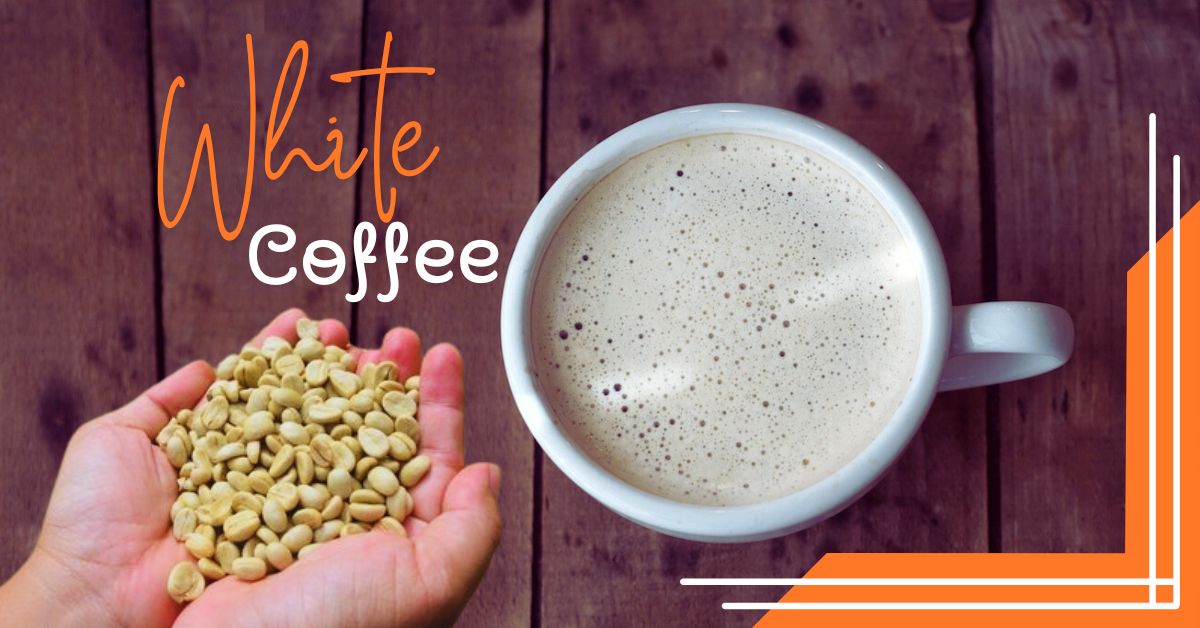Coffee lovers around the world are always looking for new and exciting ways to enjoy their favorite beverage, and white coffee has emerged as a unique alternative to traditional black coffee. With its lighter roast, milder flavor, and distinctive brewing method, white coffee offers a refreshing twist on the classic cup of joe.
In this article, we’ll explore everything you need to know about white coffee, including its health benefits, how it’s made, and how it compares to regular coffee. Plus, we’ll show you how to brew the perfect cup of white coffee at home. Whether you’re a coffee connoisseur or just curious about this new trend, you’re in for a treat.
1. What Is White Coffee?
White coffee refers to coffee made from beans that have been roasted at a much lower temperature and for a shorter time than traditional coffee beans. Unlike black coffee, which undergoes a dark roast that gives it a rich and bold flavor, white coffee beans are only lightly roasted, resulting in a pale, golden color and a much milder taste.
It’s important to note that white coffee is not coffee mixed with milk or cream, as the name might suggest. Instead, the term “white” refers to the color of the coffee beans after the roasting process. The beans retain more of their natural flavors and nutrients, making white coffee a healthier and lighter option for coffee drinkers.
Originally popular in Malaysia, white coffee has gained international attention due to its distinctive taste and potential health benefits.
2. How Is White Coffee Made?
The process of making white coffee is what sets it apart from other types of coffee. The beans used for white coffee are roasted at a lower temperature—usually around 325°F (163°C), compared to the 450-480°F (232-248°C) typically used for black coffee. This light roasting process preserves the bean’s natural oils and caffeine content, resulting in a more delicate flavor.
After roasting, the white coffee beans are ground into a finer powder than usual, which contributes to their smooth texture. The brewing method can vary, but white coffee is often brewed using an espresso machine or a drip coffee maker, ensuring that the lighter flavors are extracted without bitterness.
This gentle roasting method allows white coffee to maintain higher levels of chlorogenic acid, a compound believed to offer numerous health benefits, which we will explore next.
3. Top 5 Benefits of Drinking White Coffee [Power Subheading]
If you’re considering switching to white coffee, here are the top 5 surprising benefits you can enjoy:
1. Higher Antioxidant Content
- The light roasting process preserves more of the coffee bean’s natural antioxidants, particularly chlorogenic acid. This powerful antioxidant is known for reducing inflammation and promoting heart health. White coffee offers a higher concentration of these antioxidants compared to darker roasts.
2. More Caffeine
- While the flavor of white coffee is milder than that of black coffee, its caffeine content is actually higher. Because the beans are not roasted as long, they retain more of their natural caffeine, giving you a stronger energy boost without the bitter aftertaste.
3. Better Digestibility
- The lighter roast means that white coffee is less acidic than black coffee, making it gentler on the stomach. For those who experience acid reflux or digestive issues from drinking dark-roasted coffee, white coffee can be a great alternative.
4. Unique Flavor Profile
- White coffee offers a much different flavor experience compared to traditional coffee. It has a nutty, slightly sweet taste with none of the bitterness typically associated with black coffee. This makes it an excellent choice for those who prefer a milder, smoother coffee flavor.
5. Boosts Metabolism
- Thanks to its high levels of chlorogenic acid and caffeine, white coffee may help boost metabolism and aid in weight management. Studies suggest that chlorogenic acid can improve glucose metabolism, making it beneficial for those looking to manage their weight or improve overall metabolic health.
These benefits make white coffee an excellent choice for health-conscious coffee lovers seeking a flavorful yet gentle alternative to traditional coffee.
4. White Coffee vs. Black Coffee: What’s the Difference?
While both white coffee and black coffee come from the same beans, the differences between them lie in the roasting process, flavor, and health benefits. Here’s how they compare:
Roasting Process
- White coffee beans are roasted at a lower temperature and for a shorter time than black coffee beans. This lighter roast preserves more of the bean’s natural compounds, including caffeine and antioxidants.
- Black coffee, on the other hand, undergoes a dark roast, which breaks down more of the bean’s natural oils and reduces its caffeine content.
Flavor
- White coffee has a nutty, slightly sweet flavor with little to no bitterness. Its lighter roast allows more of the bean’s natural flavors to shine through.
- Black coffee has a bolder, richer flavor with a more pronounced bitterness, due to the longer roasting process.
Caffeine Content
- White coffee contains more caffeine because the beans lose less caffeine during the light roasting process.
- Black coffee contains slightly less caffeine, as some of the natural caffeine content is reduced during the dark roast.
Acidity
- White coffee is less acidic than black coffee, making it easier on the stomach for those with digestive issues.
- Black coffee is more acidic, which can cause discomfort for some coffee drinkers.
Ultimately, the choice between white coffee and black coffee depends on personal preference and your body’s response to each. If you’re looking for a milder, less acidic brew with more caffeine, white coffee might be your new go-to.
5. How to Brew the Perfect Cup of White Coffee at Home
Brewing a perfect cup of white coffee is slightly different from making regular coffee due to the lighter roast and finer grind of the beans. Here’s a step-by-step guide to help you enjoy the best flavor from your white coffee:
What You’ll Need:
- Freshly ground white coffee beans
- A coffee grinder (if using whole beans)
- A drip coffee maker or espresso machine
- Filtered water
- A thermometer (optional)
Steps to Brew White Coffee:
- Grind the Beans: If you’re using whole white coffee beans, grind them to a fine consistency. White coffee beans are typically harder than dark-roasted beans, so you may need a good quality grinder.
- Heat the Water: Use filtered water for the best taste. Heat the water to around 200°F (93°C), which is slightly lower than the temperature used for black coffee.
- Measure the Coffee: Use about 1 to 2 tablespoons of white coffee grounds per 6 ounces of water, depending on how strong you want your brew.
- Brew the Coffee: If using a drip coffee maker, add the grounds to the filter and pour the heated water over them. For an espresso machine, follow the machine’s instructions for brewing with finely ground coffee.
- Enjoy: Once the coffee is brewed, you can enjoy it as is or add a splash of milk or cream to complement its nutty flavor.
By following these simple steps, you can brew a smooth and flavorful cup of white coffee at home and enjoy all the benefits it offers.
6. The Origin of White Coffee: A Malaysian Specialty
White coffee has its roots in Malaysia, specifically in the town of Ipoh. Known locally as “Ipoh white coffee,” this style of coffee has been enjoyed in Malaysia for over a century. The term “white” in this context refers to the lighter roasting method, not the addition of milk or cream.
In Ipoh, white coffee is typically brewed with a mixture of palm oil margarine and sweetened condensed milk, creating a creamy, rich beverage with a slightly caramelized flavor. Over time, this unique style of coffee gained popularity throughout Malaysia and eventually spread to other parts of the world, where it is now appreciated for its distinctive taste and smoothness.
The popularity of white coffee continues to grow as more people discover its health benefits and unique flavor profile, making it a favorite among coffee enthusiasts looking for something different.
7. Where to Buy Authentic White Coffee
If you’re eager to try white coffee for yourself, there are several places where you can find authentic white coffee beans or pre-ground white coffee. Here are some of the best options:
- Specialty Coffee Shops: Many high-end coffee shops carry white coffee beans, especially those that focus on international coffee varieties.
- Online Retailers: Websites like Amazon, Coffee Bean Direct, and other specialty coffee retailers offer a wide range of white coffee options.
- Malaysian Imports: If you want the original Ipoh white coffee, look for Malaysian imports, available both online and in some Asian grocery stores.
When purchasing white coffee, make sure to check the origin and roasting process to ensure you’re getting an authentic product.
For more exciting blogs, visit our homepage Magzineco.com
Conclusion
White coffee is a unique and exciting alternative to traditional black coffee, offering a milder flavor, higher caffeine content, and numerous health benefits. Whether you’re drawn to its smooth, nutty taste or its lighter roast that’s gentler on the stomach, white coffee is worth exploring for any coffee lover.
By understanding the origins, benefits, and brewing methods of white coffee, you can enjoy a flavorful and health-conscious cup at home. With its growing popularity, you can easily find high-quality white coffee beans and experience this delightful beverage for yourself.
FAQs About White Coffee
- What is white coffee?
- White coffee refers to coffee made from lightly roasted beans, resulting in a milder flavor and higher caffeine content.
- Is white coffee the same as coffee with milk?
- No, white coffee is not made by adding milk or cream. The term “white” refers to the light roasting process.
- What does white coffee taste like?
- White coffee has a smooth, nutty flavor with little to no bitterness, making it a lighter and more delicate coffee option.
- Is white coffee stronger than black coffee?
- White coffee contains more caffeine than black coffee due to its lighter roast, but it has a milder taste.
- Can I make white coffee at home?
- Yes, you can brew white coffee at home using freshly ground white coffee beans and a drip coffee maker or espresso machine.
- What are the health benefits of white coffee?
- White coffee offers higher antioxidant content, more caffeine, better digestibility, and may help boost metabolism.
- Where can I buy white coffee beans?
- You can find white coffee beans at specialty coffee shops, online retailers, or stores that sell Malaysian coffee products.
- Does white coffee have more caffeine than black coffee?
- Yes, due to the shorter roasting time, white coffee retains more caffeine than black coffee.
- Is white coffee less acidic than black coffee?
- Yes, white coffee is generally less acidic, making it easier on the stomach for those with digestive sensitivities.
- What’s the origin of white coffee?
- White coffee originated in Ipoh, Malaysia, and is known for its unique roasting process and creamy, mild flavor.




